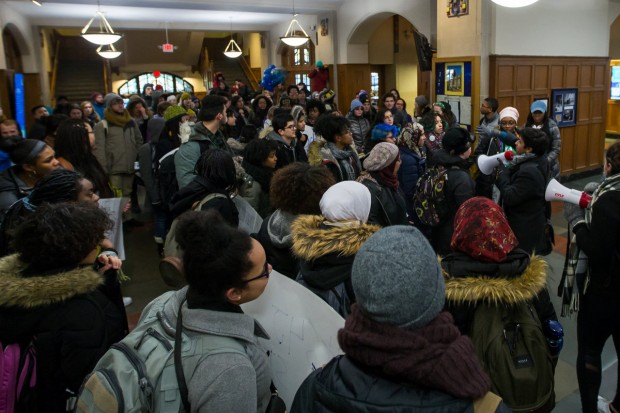In response to racist and anti-Semitic emails sent to College of Engineering students last week, Students4Justice, a student organization at the University of Michigan, coordinated a sit-in at the Michigan Union on February 9. The sit-in sought to bring attention to the organization’s list of demands for the University, which criticizes the school’s “dedication to ‘defend’ the right to Freedom of Speech” and supposed lack of concern for student safety. Among the list of demands, Students4Justice called upon the University to express solidarity with students of color, streamline the bias incident report system and increase African-American enrollment.
One of Students4Justice’s particularly astounding demands outlines a plan for the University to “create a permanent designated space on central campus for Black students and students of color to organize, and do social justice work.” The author of the list of demands specifies that the space would be separate from the Trotter Multicultural Center, which the University plans to relocate to Central Campus with a price tag of ten million dollars, because the proposed space would be “solely dedicated to community organizing and social justice work specifically for people of color.”
The same organization that criticizes the University for failing to create “an environment that engages in diversity, equity and inclusion,” is calling upon the University to undermine these ideals by facilitating a sort of de facto segregation? One where space and resources are designated for students based solely on the color of their skin?
To advocate for the ideals of diversity, equity and inclusion, while simultaneously calling upon the University to sanction these spaces on campus is both unprincipled and laughably regressive. The establishment of such a space is exclusionary and inequitable in its intent, and incompatible with the goals set forth by the University at its Diversity, Equity and Inclusion (DEI) plan launch.
Students4Justice’s demand follows a nation-wide trend of university groups calling for racially assigned spaces on their campuses, with the most notable example of California State University, Los Angeles’s decision to establish separate dorm housing for black students. Proponents of self-segregation argue that these spaces allow marginalized students to share their experiences with students with similar backgrounds and therefore ease racial tensions on campus. However, current studies indicate that participation in racially designated organizations often fosters sentiments of zero-sum competition, where one ethnic group benefits at the expense of another. One particular study, conducted by Harvard social psychologist Jim Sidanius, found that membership in ethnically-oriented student groups heightened sentiments of victimization and hostility toward inter-group relationships.
If Students4Justice genuinely wants to foster an inclusive and diverse campus, then it would be best to avoid propositions that seek to divide and separate students. The ugly history of racially designated public spaces should remain in our past—revisiting it would only fulfill the dreams of our most depraved members of society.
